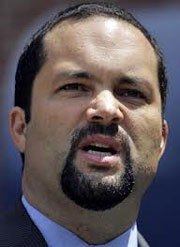
Let us recommit to the HBCU mission of St. Paul’s College
By Benjamin Todd Jealous President and CEO of National NAACP
This fall, as college campuses open their doors to the bustle of students, one historically Black institution will remain silent. In the old colonial town of Lawrenceville, Va., Saint Paul’s College has shut its doors after more than a century of operation. The college had fallen on hard times in recent years, and it serves as a canary in the coal mine for other historically Black colleges and universities that face an uncertain economic future.
Saint Paul’s College was founded in 1888 by my grandfather’s uncle, James Solomon Russell. A former slave who died an archdeacon and university principal-emeritus, Russell understood the transformative power of education. He opened Saint Paul’s Normal and Industrial School with fewer than a dozen students and a mandate to train teachers. Over the next 125 years, the school became a hub for education training in the region, producing many teachers in Virginia and neighboring states.
Many of the students who attended Saint Paul’s over the years were the first in their family to attend college. The vast majority came from poor families. The school even offered a child-care program for single parents enrolled in classes. Like so many other HBCUs in underserved communities, Saint Paul’s was a lifeline.
The recent recession hit Saint Paul’s especially hard. Like many HBCUs, the college lacked a wealthy donor base or strong endowment that could help it weather the financial storm. Faced with mounting bills, college officials closed the child-care program, laid off top teachers, and watched enrollment numbers fall back to near-1888 levels. Last fall, St. Paul’s opened its final academic year with just over 100 students before shutting its doors for good.
Saint Paul’s demise should serve as a wake-up call to those who care about the future of HBCUs. For more than 175 years, the institutions have played a crucial role in African-American advancement. HBCUs make up just 3 percent of the nation’s colleges and universities, but produce 50 percent of Black public school teachers, 80 percent of Black judges and 40 percent of baccalaureate degrees awarded to Black students in science, technology, engineering, and mathematics, the STEM fields. Dr. Martin Luther King, Jr. was a Morehouse man; Thurgood Marshall studied at Lincoln University and Howard University School of Law; Oprah Winfrey attended Tennessee State University.
However, even the wealthier HBCUs are struggling financially. Morehouse College was recently forced to furlough some of its staff, and Clark Atlanta and Hampton Universities have both announced budget shortages. This June, a Howard University trustee, Renee Higginbotham-Brooks, wrote an alarming letter about Howard’s “genuine” financial trouble.
The recession only partly explains this crisis. Part of the reason is political. In 2011 the Department of Education tightened the standards for its Parent PLUS federal loan program. The program has historically been an important service for parents of HBCU students, who are more likely to need financial support.
The new standards have had a devastating effect. In the 2012-13 school year alone, the volume of Parent PLUS loans to HBCU families dropped by 36 percent, according to an analysis by The Washington Post. Parents of 28,000 HBCU students were initially denied loans under the stricter standards, causing HBCUs as a whole to lose $150-million in expected revenue.
This slow bleed will continue as long as the tighter standards are in place. As the president of the UNCF, Michael Lomax, has recommended, the Department of Education should find a way to preserve financial aid instead of undercutting the students it is supposed to serve. Meanwhile, it is encouraging to see that the department is allowing families with small-scale debt-Black, white, or otherwise-to become eligible for PLUS loans through an appeals process.
The loan program is only one part of the solution, however. Congress should also increase funds for Pell Grants, financial subsidies for low-income students that do not have to be repaid. According to a UNCF study, 42 percent of all HBCU students come from families with incomes lower than $25,000. More than half qualify for Pell Grants. HBCUs are only as strong as their students, and their students often need significant financial support. An expansion of the Pell Grant program will help support historically Black colleges and, for many first-generation college students, help disrupt generations of family poverty.
Historically Black colleges and universities like Saint Paul’s College are an integral part of African-American history, and they need to remain an integral part of our country’s future. As we write Saint Paul’s obituary, we must not allow other colleges to suffer a similar fate. Let us recommit to James Solomon Russell’s vision, which mirrors the larger vision of the HBCU community: a school for every student, a lifeline for every dream.
This column was first published in USA Today. Contact: Ben Wrobel 917-846-0658 bwrobel@naacpnet.org @NAACPPress


Be the first to comment